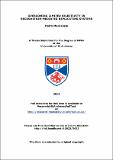Overcoming limited selectivity in recognition-mediated replicating systems
Abstract
Traditionally, synthetic chemistry has always focused on yielding a target compound
from the linear application of chemical transformations. After each step, a single
compound is usually required and the presence of mixtures often demands lengthy
purification prior to the next synthetic step. The emerging field of systems chemistry
aims to study the currently under-exploited science of networks and complex mixtures. Through the chemistry of reversible chemical bonds, dynamic covalent chemistry (DCC), the creation of networks of compounds linked through a plethora of equilibrium processes, termed dynamic combinatorial libraries (DCLs), is possible. In this research, a DCL based on imine/nitrone exchange is designed and presented. The DCL is subsequently coupled to an irreversible chemical reaction based on molecular recognition and the dramatic responses observed within the DCL are discussed.
The properties of the dynamic systems developed during the course of this research
are then applied to the competition between emerging self-replicators in an attempt to
demonstrate Darwinian Evolution. A thorough discussion of the inherent limitations
placed upon a system by kinetic selection is presented in the context of self-replicators.
Finally, non-linear chemical dynamics are discussed and successfully incorporated
into a competitive replication scenario. The application of reaction diffusion fronts
allows a self-replicating system to break the stranglehold of kinetic selection and
exhibit its dominance over weaker competitors.
Type
Thesis, MPhil Master of Philosophy
Collections
Items in the St Andrews Research Repository are protected by copyright, with all rights reserved, unless otherwise indicated.

